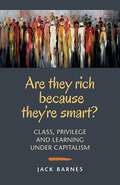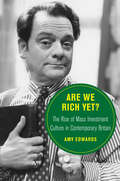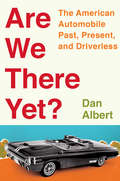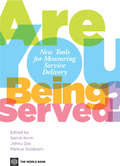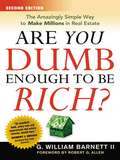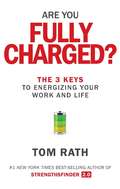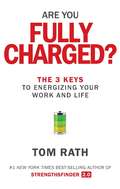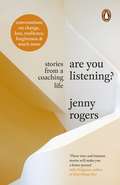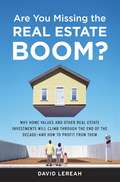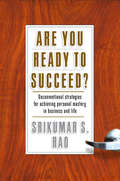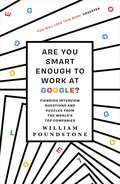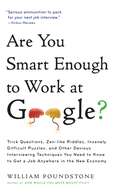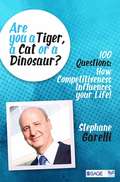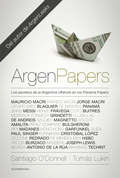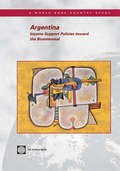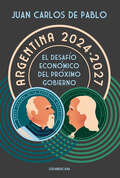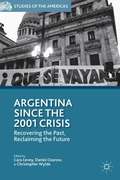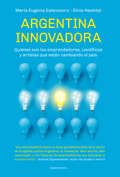- Table View
- List View
Are They Rich Because They’re Smart?: Class, Privilege And Learning Under Capitalism
by Jack BarnesThe 2020 print edition was used as the source for text and page numbers. Description: (Use back cover text from print edition) Are They Rich Because They’re Smart? explains the sharpening class inequalities in the United States and the resulting conflicts accelerated by today’s slow-burning world depression. It takes apart the self-serving rationalizations of a growing layer of well-paid professionals that their schooling and ‘brightness’ equip them to ‘regulate’ the lives of working people, who can’t be trusted to know what’s in our own interests. In the coming battles forced upon us by the capitalist rulers, says Jack Barnes, workers will begin to transform ourselves and our attitudes toward life, work, and each other. Only then will we discover our own worth and learn what we’re capable of becoming.
Are We Rich Yet?: The Rise of Mass Investment Culture in Contemporary Britain (Berkeley Series in British Studies #21)
by Amy EdwardsAn in-depth history of how finance remade everyday life in Thatcher's Britain.Are We Rich Yet? tells the story of the financialization of British society. During the 1980s and 1990s, financial markets became part of daily life for many Britons as the practice of investing moved away from the offices of the City of London, onto Britain’s high streets, and into people’s homes. The Conservative Party claimed this shift as evidence that capital ownership was in the process of being democratized. In practice, investing became more institutionalized than ever in late-twentieth-century Britain: inclusion frequently meant tying one’s fortunes to the credit, insurance, pension, and mortgage industries to maintain independence from state-run support systems. In tracing the rise of a consumer-oriented mass investment culture, historian Amy Edwards explains how the "financial" become such a central part of British society, not only economically and politically, but socially and culturally, too. She shifts our focus away from the corridors of Whitehall and towards a cast of characters that included brokers, bankers and traders, newspaper editors, goods manufacturers, marketing departments, production companies, and hundreds of thousands of ordinary men and women. Between them, they shaped the terrain upon which political and economic reform occurred. Grappling with the interactions between structural transformation and the rhythms of everyday life, Are We Rich Yet? thus understands the rise of neoliberalism as something other than the inevitable outcome of a carefully orchestrated right-wing political revolution.
Are We There Yet?: The American Automobile Past, Present, And Driverless
by Dan AlbertTech giants and automakers have been teaching robots to drive. Robot-controlled cars have already logged millions of miles. These technological marvels promise cleaner air, smoother traffic, and tens of thousands of lives saved. But even if robots turn into responsible drivers, are we ready to be a nation of passengers? In Are We There Yet?, Dan Albert combines historical scholarship with personal narrative to explore how car culture has suffused America’s DNA. The plain, old-fashioned, human-driven car built our economy, won our wars, and shaped our democratic creed as it moved us about. Driver’s ed made teenagers into citizens; auto repair made boys into men. Crusades against the automobile are nothing new. Its arrival sparked battles over street space, pitting the masses against the millionaires who terrorized pedestrians. When the masses got cars of their own, they learned to love driving too. During World War II, Washington nationalized Detroit and postwar Americans embraced car and country as if they were one. Then came 1960s environmentalism and the energy crises of the 1970s. Many predicted, even welcomed, the death of the automobile. But many more rose to its defense. They embraced trucker culture and took to Citizen Band radios, demanding enough gas to keep their big boats afloat. Since the 1980s, the car culture has triumphed and we now drive more miles than ever before. Have we reached the end of the road this time? Fewer young people are learning to drive. Ride hailing is replacing car buying, and with electrification a long and noble tradition of amateur car repair—to say nothing of the visceral sound of gasoline exploding inside a big V8—will come to an end. When a robot takes over the driver’s seat, what’s to become of us? Are We There Yet? carries us from muddy tracks to superhighways, from horseless buggies to driverless electric vehicles. Like any good road trip, it’s an adventure so fun you don’t even notice how much you’ve learned along the way.
Are Weak Banks Leading Credit Booms? Evidence from Emerging Europe
by Natalia T. Tamirisa Deniz IganA report from the International Monetary Fund.
Are You Being Served? New Tools for Measuring Service Delivery
by Markus Goldstein Jishnu Das Samia AminThis publication presents tools and techniques for measuring service delivery in health and education and people's experiences from the field in deploying these methods. It begins by providing an introduction to the different methodological tools available for evaluating the performance of the health and education sectors. Country specific experiences are then explored to highlight lessons on the challenges, advantages and disadvantages of using different techniques to measure quality in a variety of different contexts and of using the resulting data to affect change. This book is a valuable resource for those who seek to enhance capacity for the effective measurement of service delivery in order to improve accountability and governance and enhance the quality of service delivery in developing countries.
Are You Change-Ready?: Preparing for Organizational Change
by Harvard Business Review PressFor an organization to be change-ready, three key conditions must be present. This chapter explores these conditions and explains how to cultivate them if they don't already exist in the organization.
Are You Dumb Enough to Be Rich?: The Amazingly Simple Way To Make Millions In Real Estate
by William BarnettNo investment strategy has created more millionaires than real estate. Even in less-than-stellar economies, real estate offers a ""safe harbor"" to people wishing to make smart, low-risk investments. And now there's a foolproof, step-by-step system even financial novices can use to achieve wealth and financial freedom. Are You Dumb Enough to Be Rich? gives people the resources and information they need to make serious amounts of money from buying and selling real estate. This essential book walks readers through the entire process, providing them with a 120-day plan for starting down the road to building real estate wealth. Too many real estate books focus on stories and unlikely examples about how other people became rich. Are You Dumb Enough to Be Rich? offers real strategies on finding the best opportunities, avoiding the common pitfalls of real estate investment, and building personal and professional credibility. Straightforward and easy-to-follow, the book empowers readers to take their first tentative steps toward real estate investing with confidence. Are You Dumb Enough to Be Rich? demonstrates that it doesn't take a genius to make money -- lots of it -- in real estate.
Are You Fully Charged?
by Tom RathTom Rath, author of five influential bestsellers, reveals the three keys that matter most for our daily health and well-being, as well as our engagement in our work. Drawing on the latest and most practical research from health, psychology, and economics, this book focuses on changes we can make to create better days for ourselves and others. Are You Fully Charged? will challenge you to stop pursuing happiness and start creating meaning instead, lead you to rethink your daily interactions with the people who matter most, and show you how to put your own health first in order to be your best every day.
Are You Fully Charged? (Intl)
by Tom RathTom Rath, author of five influential bestsellers, reveals the three keys that matter most for our daily health and well-being, as well as our engagement in our work. Drawing on the latest and most practical research from health, psychology, and economics, this book focuses on changes we can make to create better days for ourselves and others. Are You Fully Charged? will challenge you to stop pursuing happiness and start creating meaning instead, lead you to rethink your daily interactions with the people who matter most, and show you how to put your own health first in order to be your best every day.
Are You Listening?: Stories from a Coaching Life
by Jenny Rogers'Absorbing' - The Guardian'Are You Listening? is a real gem: full of insights about the human psyche, non-fiction, as gripping as a novel' - Miranda Levy, author of THE INSOMNIA DIARIES on TwitterIt is very rare as an adult to find a place where you are not judged, where you can be open, honest and vulnerable: that is exactly what coaching provides. Through twenty stories from her 32 years in the coaching room, Jenny demonstrates how even the most successful people can be held back by doubts, limitations and human dilemmas, such as: · 'Can I be my real self at work?'· 'What's my purpose in life?'· 'How do I deal with unhappiness and disappointment?'· 'Should I go for a job where I get paid a fortune but know I'd be miserable?'Through these moving, beautifully written stories, Jenny reflects on the meaning of modern relationships, demonstrating how the courage to be vulnerable can make a huge, transformative difference to the quality of all our lives. 'Jenny Roger cherishes the core of truth in each of us' - Sally Helgesen, author of HOW WOMEN RISE
Are You Missing the Real Estate Boom?: The Boom Will Not Bust and Why Property Values Will Continue to Climb Through the End of the Decade - And How to Profit From Them
by David LereahAreyoumissing the real estate boom? Can you increase your wealth from it? For most people—including current homeowners—the answer is a resoundingyes. But it’s not too late to increase your stake in the greatest real estate boom of our generation. Whether you are a first-time buyer or already own your home,Are You Missing the Real Estate Boom?will show you how you can dramatically increase your overall wealth. Author David Lereah, chief economist for the National Association of Realtors, shows why the real estate market is poised to climb higher over the next decade—and explains what you can do to profit from it. Lereah calls today’s market a “once-in-every-other generation opportunity. ” Today's boom is not just driven by low interest rates—there are a host of demographic and economic reasons why real estate will continue to outpace other investments, from the growing needs of the baby-boomer generation and the rise of the “echo” boomer generation to the new ways real estate is marketed and sold. Are you a first-time buyer? A current homeowner considering whether or not to trade up? There has never been a better time to do so, Lereah convincingly claims. InAre You Missing the Real Estate Boom?, Lereah explains what to look for when you’re buying a home; which improvements add the most value to your current home; what to consider when purchasing rental properties; how to evaluate real estate investment trusts (or REITs); and the pros and cons of second homes. Full of detailed information on how to work with a real estate agent and a mortgage lender, how to analyze local markets and regional fluctuations, and how to best finance your investment,Are You Missing the Real Estate Boom?offers readers the seasoned advice they need to invest with confidence and reap outsized rewards. Are You Missing the Real Estate Boom?author David Lereah, chief economist for the National Association of Realtors®, asks. We are experiencing a historic wealth-building opportunity. To ensure that your don’t miss out, Lereah provides the tools, information, and analysis you need to become a savvy real estate investor. And he shows how to integrate real estate into your overall investment strategies and financial planning goals. Among the information you’ll find in the book: • How to become a master at dealing with real estate agents, brokers, and lenders. • Which home improvements will result in the greatest long-term gains. • How to identify the vacation homes and regions that will increase the most in value. • How to finance a first-time home—with or without a big down payment. The long-term fundamentals for housing remain strong into the foreseeable future, claims Lereah. Far from a real estate “bubble,” what we are experiencing today is a phenomenon that takes place only once every other generation: a long-term real estate market expansion. Isn’t it time you started taking advantage of it today?
Are You Paying Too Much for That Acquisition?
by Robert G. Eccles Thomas C. Wilson Kersten L. LanesDespite 30 years of evidence demonstrating that most acquisitions don't create value for the acquiring company, executives continue to make more deals, and bigger deals, every year. There are plenty of reasons why value isn't created, but many times it's simply because the acquiring company paid too much. It's not, however, that acquirers pay too high a price in an absolute sense. Rather, they pay more than the acquisition is worth to them. What is that optimum price? The authors present a systematic way to arrive at it, involving several distinct concepts of value. In today's market, the purchase price of an acquisition will nearly always be higher than the intrinsic value of the company--the price of its stock before any acquisition intentions are announced. The key is to determine how much of that difference is "synergy value"--the value that will result from improvements made when the companies are combined. This value will accrue to the acquirer's shareholders rather than to the target's shareholders. The more synergy value a particular acquisition can generate, the higher the maximum price an acquirer is justified in paying. Just as important as correctly calculating the synergy value is having the discipline to walk away from a deal when the numbers don't add up. If returns to shareholders from acquisitions are no better in the next ten years than they've been in the past 30, the authors warn, it will be because companies have failed to create systematic corporate governance processes that put their simple lessons into practice.
Are You Ready to Succeed?: Unconventional Strategies to Achieving Personal Mastery in Business and Life
by Srikumar S. RaoThe premise is simple: A person's ideal life, especially their career, can be carefully conceived and crafted. Based on Dr. Rao's popular course "Creativity and Personal Mastery" at Columbia University's Graduate School of Business, this book offers a series of readings, exercises, and lessons drawn from both spiritual and commercial situations that enable you to reconstruct and improve your professional world. This transformation will turn your life around and help you become exponentially more effective in your chosen career, and thereby flourish in all aspects of your life. Whether you are questioning the value of money or the core values of your life, this book is a powerful tool that will help you to "discover the purpose that can suffuse your life and bring stars to your eyes."
Are You Smart Enough to Work at Google?: Fiendish Puzzles and Impossible Interview Questions from the World's Top Companies (Playaway Adult Nonfiction Ser.)
by William PoundstoneYou are shrunk to the height of a penny and thrown in a blender. The blades start moving in sixty seconds. What do you do? If you want to work at Google, or any of the world's top employers, you'll need to have a convincing answer to this and countless other baffling puzzles.Are You Smart Enough to Work at Google? Reveals the new extreme interview questions in the postcrash, hypercompetitive job-market and uncovers the extraordinary lengths to which the best companies will go to find the right staff. Bestselling author William Poundstone guides readers through the surprising solutions to over a hundred of the most challenging conundrums used in interviews, as well as covering the importance of creative thinking, what your Facebook page says about you, and what really goes on inside the Googleplex. How will you fare?
Are You Smart Enough to Work at Google?: Trick Questions, Zen-like Riddles, Insanely Difficult Puzzles, and Other Devious Interviewing Techniques You Need to Know to Get a Job Anywhere in the New Economy (Playaway Adult Nonfiction Ser.)
by William PoundstoneYou are shrunk to the height of a nickel and thrown in a blender. The blades start moving in 60 seconds. What do you do? If you want to work at Google, or any of America's best companies, you need to have an answer to this and other puzzling questions.ARE YOU SMART ENOUGH TO WORK AT GOOGLE? guides readers through the surprising solutions to dozens of the most challenging interview questions. The book covers the importance of creative thinking, ways to get a leg up on the competition, what your Facebook page says about you, and much more. ARE YOU SMART ENOUGH TO WORK AT GOOGLE? is a must read for anyone who wants to succeed in today's job market.
Are you a Tiger, a Cat or a Dinosaur?: How Competitiveness Influences your Life!
by Professor Stephane GarelliHave you had questions for which you struggled to find the right answers? For example: Should I be a specialist or can I remain a generalist? Are good quality products always expensive? How does my salary compare with people in other countries? Are leaders born or created? Should political leaders be better educated or not? Is being ambitious a negative or a positive trait? There is a plethora of such questions that this book tries to answer in the most thought-provoking way. It is unputdownable and addictive. The author welcomes you into the world of competitiveness and takes you through a roller-coaster ride. Thirty years ago, the term competitiveness was virtually unknown. Today, it has become viral and has captured the world’s imagination. Politicians, businessmen, and media constantly refer to it. This book is an illustration of how competitiveness has changed the world and our lives by a professor who has pioneered research in this field. This book encompasses several original ideas that help to better understand how nations, companies, and people compete for prosperity. It features 100 questions answered in two pages each. The answers stress the impact of competitiveness in our daily lives using a jargon-free lucid style.
Area One Farms
by Annelena Lobb Jose B. Alvarez Forest L. ReinhardtIn 2017, Joelle Faulkner, CEO of Area One Farms, a Canadian private-equity fund focused on investing in the best Canadian farms and helping them expand, considered the merits and disadvantages of expanding her business to the U.S. While the markets shared some similarities, Faulkner did not know the U.S. market as well as the Canadian one. Could her joint venture partnership model work as well in the U.S. as it had in her home country?
Arge Construction Company (B)
by John D. MacomberSupplement - Disaster relief, Infrastructure, Social responsibility
ArgenPapers: Los secretos de la Argentina offshore en los Panamá Papers
by Santiago O'Donnell Tomás LukinQuiénes son los políticos, los empresarios y las celebridades argentinas que tienen firmas en paraísos fiscales, y qué es lo que buscan esconder en ellos. Mossack Fonseca era uno de los creadores de sociedades offshore más importantes del planeta hasta que, a comienzos de 2016, una megafiltración expuso los secretos de una red financiera global al servicio de la fuga de capitales, la evasión impositiva, el ocultamiento y el lavado de dinero. Los primeros archivos que dieron forma a los Panamá Papers revelaron un capítulo de la disputa entre la Argentina y los fondos buitres. Los acreedores reclamaban información sobre Lázaro Báez y los Kirchner. Sin embargo, el nombre que apareció fue el de Mauricio Macri, uno de los cinco presidentes en funciones mencionados entre los once millones y medio de documentos hackeados. En esa gigantesca e intrincada base de datos, figuran también varios integrantes del PRO, futbolistas, y los dueños, accionistas y directivos de las doscientas empresas más grandes del país, así como bancos, abogados y firmas contables de prestigio. Santiago O'Donnell, elegido por el Consorcio Internacional de Periodistas de Investigación que centralizó la cobertura de dimensión global, junto con Tomás Lukin, experto en el mundo offshore, pasaron meses cruzando información de firmas que son cáscaras vacías y directivos con nombres de paja. De esa compleja indagación surgió este libro fascinante que revela cómo se maneja el poder real y quiénes son los verdaderos dueños de la Argentina. Mauricio Macri, Franco Macri, Jorge Macri, Lázaro Báez, Blaquier, De Narváez, Panamá, Jinkis, Messi, Heinze, Frávega, Coto, Buitres, Mossack Fonseca, Grindetti, Clusellas, De Andreis, Saguier, Magnetto, Soldati, Amalita, Pérez Companc, Bulgheroni, FIFA, Madanes, Hong Kong, Garfunkel, Suiza, Paul Singer, Eurnekian, Cristóbal López, Ciccone, Redrado, De Mendiguren, HSBC, Arcor, Burzaco, Massera, Joseph Lewis, Nevada, Antonio De La Rúa, Bahamas, Techint.
Argentina
by The World BankFollowing the serious economic crisis in 2001-02, Argentina mobilized an unprecedented effort to provide income support to the segment of the population most in need. Now, as growth has returned and social indicators recovered to precrisis levels, there is an opening to move from emergency support programs to a more comprehensive, long-term, and sustainable strategy for social protection. The challenge is to design and fully implement a social protection system that has adequate coverage and benefits and is integrated and fiscally and politically sustainable. The analysis contained in this book aimed to contribute to and inform the debate about the future of income support policies in Argentina, taking the views, values, and preferences of the stakeholders and the population as starting points. The research included two innovative efforts to collect and understand the landscape of ideas regarding options for social protection circulating in Argentina: first, an extensive set of consultations with policy makers and practitioners in social policy, mainly at the provincial level; and second, a national, representative opinion survey on the views and perceptions of the population regarding social policy and income support programs in particular.
Argentina 2024-2027: El desafío económico del próximo gobierno
by Juan Carlos de PabloLos laberintos de la credibilidad, la necesidad de crecimiento del PBI, la realidad del bimonetarismo, las maldiciones locales de la pampa húmeda y la coparticipación, el debate shock / gradualismo: Juan Carlos de Pablo repasa y propone los temas para no volver a fallar en la economía argentina en el periodo 2024-2027. Dedicado a quien gane las elecciones nacionales de este año y gobierne la Argentina entre 2024 y 2027, este libro se propone como un aporte a la política económica a ser aplicada en ese período. Con su personalísimo estilo y su inefable capacidad de hacer entendible, concreto y cotidiano lo que a priori puede presentarse como complicado, abstracto y lejano, Juan Carlos de Pablo condensa sus más de cincuenta años de experiencia y destila el conjunto a la vez indispensable e ineludible de cuestiones sobre las que el próximo gobierno necesariamente deberá fijar posición. El "checklist" resultante, que se planta sobre una aguda consideración del contexto político y económico nacional e internacional, despliega de sí agenda, hoja de ruta y recomendación. En estas páginas encuentran lugar, entre otros temas, los laberintos de la credibilidad, la realidad tangible del bimonetarismo, la necesidad de crecimiento del PBI, las maldiciones locales de la pampa húmeda y de la coparticipación, el péndulo shock / gradualismo y hasta un originalísimo y reflexivo análisis de los cuarenta años de democracia. En el año en que la Argentina vuelve a las urnas para elegir presidente, de Pablo lo hace de nuevo: con lucidez y sentido del humor pone teoría, conocimiento técnico y datos al servicio de la toma de decisiones de gobernantes y ciudadanos.
Argentina Power - Don't Cry for Me Argentina
by Nori Gerardo Lietz Sayiddah Fatima McCreeIn 2016, Bruce Wayne, Managing Director of Energy Finance Corporation ("EFC"), was refining the Investment/Credit Committee materials for the development of up to 10 power generating plants in Argentina. As a subsidiary of the much larger International Conglomerate Corporation ("ICC"), EFC had to convince ICC's Investment/Credit Committee to provide capital despite the many risks associated with investing in Argentina.
Argentina Since the 2001 Crisis
by Christopher Wylde Cara Levey Daniel OzarowThis timely and interdisciplinary volume analyzes the many impacts of and contrasting responses to the Argentine political, economic, and social crises of 2001-02. Chapters offer original theoretical models and examine the relationship between political, cultural, economic, and societal spheres.
Argentina innovadora: Quiénes son los emprendedores, científicos y artistas que están cambiando el país
by Silvia Naishtat María Eugenia EstenssoroCómo hicieron los emprendedores tecnológicos que hace veinte años decidieron realizar el sueño de una nación innovadora y creativa, reconocida por su talento en el resto del mundo. En América Latina hay siete unicornios, y cuatro son argentinos. No se trata de seres mitológicos, sino de empresas tecnológicas valuadas en más de mil millones de dólares. No solo se distinguen por su valor, sino por llevar en su ADN una gran dosis de espíritu rupturista e innovador. Surgieron y se desarrollaron a contramano de la realidad local, y hoy son multinacionales que generan riqueza, trabajo de calidad y crecimiento sostenido. Mercado Libre es la principal plataforma de comercio electrónico de habla hispana y un caso de estudio en la Universidad de Stanford. Despegar es la quinta agencia de turismo del mundo. Globant suministra tecnología a empresas como Disney y Google. OLX está presente en ciento veinte países y es la mayor compañía de venta de clasificados por internet en la India. Pero no son casos excepcionales, y el término "unicornios" se extiende a otras empresas con las mismas características: Gran Data anticipa el comportamiento de los consumidores para las principales compañías telefónicas de los Estados Unidos; Satellogic ya lanzó cinco satélites al espacio que brindan imágenes con una resolución nunca antes alcanzada; y Bioceres posee un gen resistente a la sequía que puede permitir una nueva revolución productiva en el agro. Luego de dos años de viajes y entrevistas, María Eugenia Estenssoro y Silvia Naishtat concluyen que estos son ejemplos descollantes de que la Argentina no es solo un semillero de futbolistas de calidad internacional: con políticas públicas adecuadas, el país puede aspirar también a ser un polo mundial de innovación en áreas tan diversas como la biotecnología, el arte y la comunicación.
